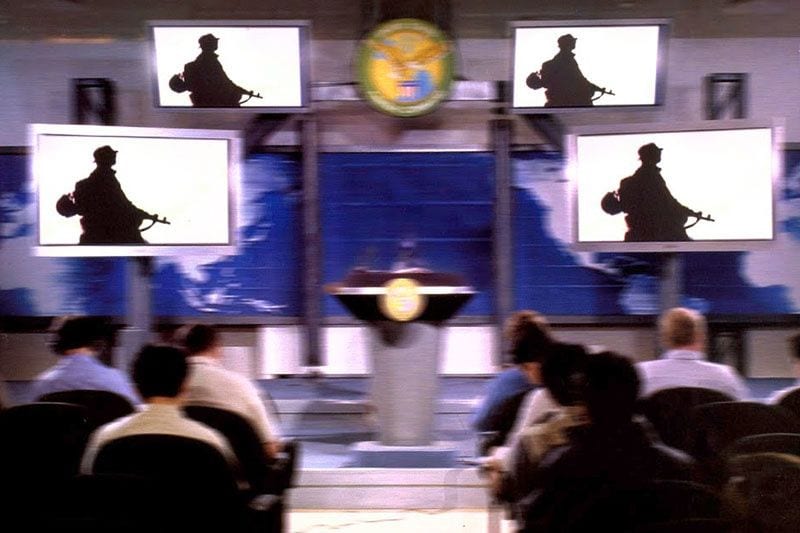
“The sole purpose of our actions was to sell the American people on the case for war with Iraq. Polls show that we did. Mr. Trump and his team are trying to do it again. If we’re not careful, they’ll succeed.” — Lawrence Wilkerson, New York Times, 5 February, 2018
“You cannot wage a war without news, without media, without propaganda.” — Samir Khader, senior producer,
Al-Jazeera, 2004
Speaking to reporters at CentCom in Qatar, 700 miles outside Baghdad just after the war in Iraq started, the US Press Officer, Lieutenant Josh Rushing, lays out the parameters for questions. He’s not looking to get into details, where missiles are landing or how many Iraqis are in dead or wounded; he’s looking for a bigger picture. To this end, he announces he’s ready to discuss the US desire to “bring freedom, that’s what we’re really here to do.”
In this brief scene, Control Room lays out the difficult relationship between government officials and journalists. Jehane Noujaim’s 2004 documentary focuses on efforts to report on the war in Iraq, positing Al-Jazeera as an alternative organization to US news agencies whose access to information is limited, in part by system of embedded journalism during the war. In the 15 years since the film’s release, of course, the problems of gaining access and deciphering truths have only escalated. The rise of social media, alternative facts, and charges of “fake news” — not to mention deliberate obfuscation by authorities — all make it that much harder to report news.
Rather than attempt to discover or even postulate a broad truth, Control Room — which is screening today at the IFC Center in Greenwich Village, New York, as part of the Stranger Than Fiction documentary series, followed by a Q&A with Josh Rushing and producer Rosadel Varela — takes as its object a small piece of the news making and news reporting apparatus, which is to say, Al-Jazeera, the Arab television network that has been accused repeatedly by US officials of being “pro-Saddam” (or, as Donald Rumsfeld calls it, “the mouthpiece of Osama Bin Laden”).
Such allegations, the film suggests, are at once banal and inevitable: they are part of the American war effort, which, as Al-Jazeera senior producer Samir Khader observes, entails controlling media and producing propaganda. His remark does not demand or assume a specific agent in this process: all war is always supported by propaganda. It only looks like truth if you believe it.
This generalization is the film’s less neatly consistent subject matter, aside from Al-Jazeera during the war against Iraq. Objectivity in news and documentary is impossible. This understanding leads to repeatedly articulated frustrations for interviewees like Lt. Rushing and Sudanese-born Al-Jazeera correspondent Hassan Ibrahim, who form the film’s emotional bookends. Each is worried by what he sees in different ways, and each provides the film with an alternative perspective on what seems simple: the horrors of war.
Noujaim structures her film so that events appear to unfold before the camera’s objective eye. President George W. Bush appears on US television to declare the inevitability of his intentions (if Saddam Hussein and his sons do not fulfill their “responsibility” to leave Iraq, “We will rise to ours… The war is directed against the lawless men who lead your nation, not you”), Iraqis and especially Iraqi journalists respond to the ultimatum (“Mr. Bush is talking about peace. What peace?”), and the shock and awe campaign begins.
With footage and interviews shot at CentCom and at the Al-Jazeera offices in Baghdad, Control Room tracks how “control” of imagery and ideas is crafted and lost, by the US military as much as by anyone who might try to oppose that awfully imposing, well-funded, and oddly unified view. That’s not to say that spokespeople for both/all sides don’t expose narrative inconsistencies. Ibrahim pronounces his frustration over Arab anti-Semitism: “Everything in the Middle East is an Israeli conspiracy,” he sighs. Noting that Arabs tend to see images of Israeli attacks on Palestinians as of a piece with US attacks on Iraqis (wounded children, burned out buildings, exploded cars), he asserts that “People are against this war, and people matter.”

